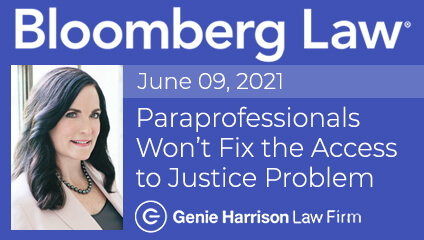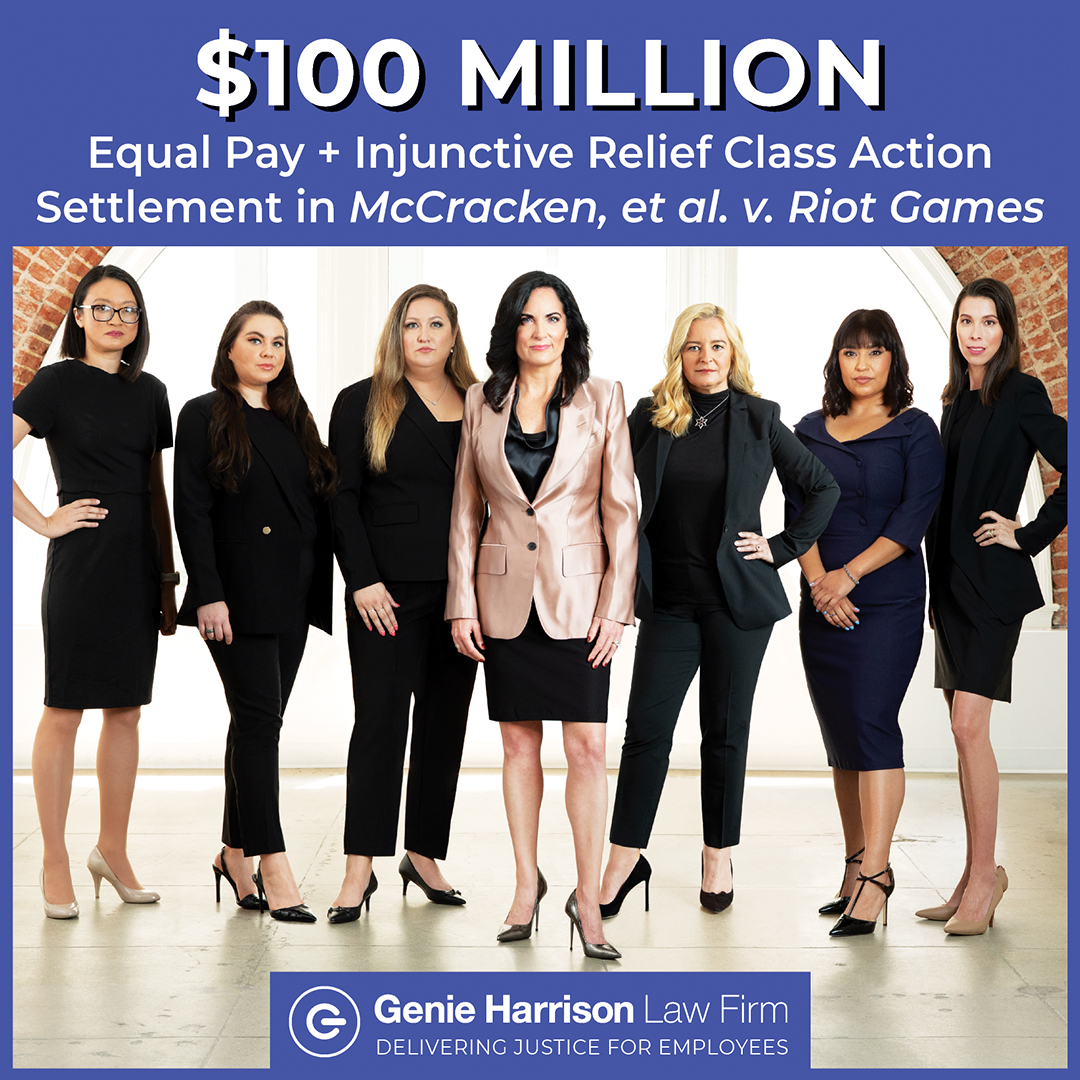Paraprofessionals Won’t Fix the Access to Justice Problem
by Genie Harrison for Bloomberg Law, June 9, 2021
Opening up the practice of law and law firm ownership to “paraprofessionals” is being promoted—including by investors—as a way to improve access to justice. California attorney Genie Harrison, president of the Consumer Attorneys Association of Los Angeles, says data does not support this concept, and such a move will seriously undermine the integrity of the legal profession.
As the saying goes, “The road to hell is paved with good intentions.”
Many who champion new legal licensing assert that their goal is a laudable one—increasing “access to justice.” But venture capitalists, accounting companies, and big tech see another profit center.
Because most states have laws prohibiting non-lawyers from owning law firms and preventing lawyers from sharing fees with non-lawyers, big business has been unable to get a toehold in the world of lawyering. That is, until the “access to justice” opportunity presented itself.
The legal system is broken, they claim, because legal services are too expensive. Though businesses can indeed afford lawyers and the poor can receive no-cost services, it is not true that everyone else is “on their own,” as posited in a Bloomberg Law Insight by Jason Solomon and Noelle Smith.
In California, for example, consumers and employees, whose product liability, personal injury, and employment cases make up more than 40% of unlimited jurisdiction Superior Court dockets, are represented by lawyers on a contingency basis. Even though the cost of legal services is no barrier for these plaintiffs, big business wants in on these cases and has co-opted the “access to justice” messaging.
The Justice Gap
In 2019, the California State Bar commissioned a study to assess the purported justice gap, the results of which it uses to justify paraprofessional licensing and non-lawyer ownership of law firms. Though characterizing the results as demonstrating a “crisis,” the reality is different. An example elucidates the ruse.
Of 3,385 survey participants who said they had employment issues, just 12 responded that they did not receive representation for an issue due to cost. So 0.0035% is a crisis? Though respondents were not asked whether they sought out a contingency lawyer or if lawyers said their cases lacked merit, the state bar used those 12 respondents to proclaim employment issues are part of the “crisis” in California legal services.
That some do not have legal representation is no reason to scrap the entire system or create new licenses—paraprofessionals in California—with new oversight obligations for overworked state bar agencies. Most states already recognize less skilled professionals—paralegals—who have a license, are well-trained, and specialize in certain areas of the law. In California, lawyers supervise paralegals, and paralegals are not authorized to make formal court appearances.
Same Fees as Licensed Attorneys
Under California’s paraprofessional proposal, lawyers would not supervise the new licensees, yet paraprofessionals could appear in court. And they would be costly.
A “Limited License Legal Technician” in Washington charges $100-$150 per hour, the same rate many lawyers charge, and the program has cost Washington $1.4 million more than it generated.
How does such an expensive program with high hourly rates charged by licensees revolutionize access to justice? Why not simply modify the laws relating to paralegal practice? And why, as in California, is there no proposed fee cap for the new licensees if the intent is to service indigent through middle-income clients?
For actual progress, we should instead reduce the costs of law school to make public interest jobs or lower hourly rates viable for lawyers. Law school graduates should be offered loan forgiveness programs in exchange for one or two years of representation of low- or middle-income clients.
Law Firm Ownership Open
None of these, or any other, good suggestions are under consideration in California. Instead, the state bar has rushed headlong to institute the paraprofessional model. And in parallel, it seeks to create a regulatory “sandbox” in which venture capital firms, accounting companies, and even insurance companies can own law firms.
Gone will be the rules prohibiting lawyers from sharing fees with non-lawyers, the violation of which currently results in felony prosecutions. And along the way, the California State Bar has ignored concerted and thoughtful opposition by legal aid organizations, bar associations, and thousands of lawyers.
Deregulation in England and Wales
Proponents of the new model point to the alleged success of alternative structures in other countries. Not so, says the Boston Consulting Group (BCG). Deregulation of legal services in England and Wales has had only limited success. While a “few of the benefits typically associated with deregulation have materialized,” the most common “arguments, such as lower prices and better quality of legal services, cannot be proven to have materialized based on the data and evidence” analyzed.
“Increased competition should ideally lead to lower prices across various legal services,” says BCG. “But the [Legal Services Board] reports more price increases than decreases across 13 different legal services relative to inflation.” Nor has there been an unmistakable rise in the quality of legal representation stemming from deregulation.
The remedy to the access to justice problem is not new licensing, regulation, or deregulation. Nor is it the corporatization of the practice of law. “Uberizing” legal services will further erode access to justice for the indigent and other vulnerable populations by consolidating firm ownership and driving up legal fees, as has occurred in England and Wales.
When hedge funds and insurance carriers have a piece of the market, legal services will change to maximize profits, with an increase in costs and a focus on the bottom line. One easily foreseeable looming conflict is the fiduciary duty to maximize shareholder profits versus victims’ rights to pursue systemic change and modest compensation.
If states truly want to address the “access to justice” problem, they will increase funding for legal services and pro bono programs and make legal education less costly. Or they will at least give such solutions, and many others, serious consideration. Though good intentions pave the “access to justice” road, the current route leads only to one destination—the profits-over-people dystopia pursued for decades by big business.
This column does not necessarily reflect the opinion of The Bureau of National Affairs, Inc. or its owners.
Author Information
Genie Harrison represents plaintiffs in employment and sexual abuse cases as lead trial attorney at the Genie Harrison Law Firm APC in Los Angeles. She is also president of the Consumer Attorneys Association of Los Angeles.





